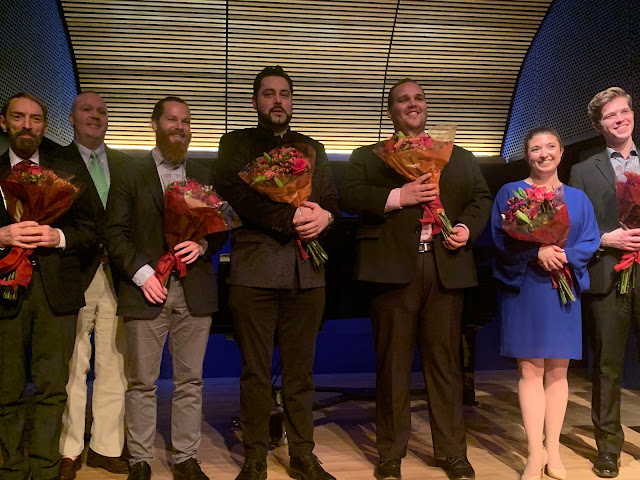William Hicks, Cameron Pieper, Jason Duika, Dylan Davis, Olivia Manna, and Jacob Beranek
Action for Artists is relatively new on the scene as an institution for supporting young artists with financial grants, educational resources, and mentorship, designed to bring their career aspirations into reality. This goal, as you know Dear Reader, is dear to our heart. This is a time that is particularly difficult for young artists, many of whom lost career momentum due to Covid.
Last night at The National Opera Center they celebrated their second year with a gala benefit concert by presenting their 2023 awards to five worthy recipients: three singers, all accompanied by the excellent William Hicks (Founder and President of AFA), a pianist, and a composer.
Mezzo soprano Olivia Manna (from heaven) enchanted us with her warm resonant instrument and the finesse with which she employed it. We enjoyed hearing the wide range of her repertory from lied to opera to Broadway. Unlike other opinions we do not perceive Broadway music as different from opera. A well trained voice should be able to do justice to all kinds of song.
From Ms. Manna's operatic repertoire we heard "O pallida" from Act III of Pietro Mascagni's L'amico Fritz. The gypsy Beppe (a trouser role) tells Fritz about his view of love, both the pain and the pleasure. Most opera lovers have not heard this charming but rarely produced opera but many know the "Cherry Duet". The aria Ms. Manna selected is a great choice for a mezzo and permits varying colors from one verse to the next.
Another selection was also chosen from a rarely hear opera--Ambroise Thomas' Mignon. In "Connais-tu le pays" the eponymous heroine sings of her homeland with sorrow and longing. The aria was sweetly sung. Given appropriate delicacy was Richard Strauss' "Allerseelen" which was seasonably appropriate since All Soul's Day has just passed. "All the things you are" from Jerome Kern's Very Warm for May is an all out love song and an American classic, sounding extra special sung by a fine operatic voice.
Jason Duika is a hearty full-voiced baritone with uncanny acting ability. We reviewed his performance as Hérode in Massenet's Hérodiade about four years ago and this is what we wrote. His virile instrument is of fine and full tone and his delivery of "Vision fugitive" was impassioned and moving. Now imagine how his voice has grown in four years!
In addition to his performance as the self-important Escamillo in "Votre toast" from Bizet's Carmen, he presented two frightening villains. We might call this "many shades of menace". He was scary as Scarpia in Puccini's Tosca, even scarier as Iago reciting his misanthropic creed from Verdi's Otello, and scarier yet in "Eri tu" from Verdi's Un Ballo in Maschera. Each aria was given a different coloration and Mr. Duika used gesture and facial expression to illuminate each character.
Tenor Dylan Davis also chose a variety of material to demonstrate his versatility. He has the kind of powerful tenor that is beloved by audiences. We thought the arrogant Duke singing "La donna è mobile" from Verdi's Rigoletto was a better choice than the shy Nemorino from Donizetti's L'elisir d'amore singing "Una furtiva lagrima" which usually melts our heart but did not on this occasion. Maybe big Verdian voices just don't do "shy".
His expansive singing seemed well suited to the impassioned "Bring him home" from Claude-Michel Schönberg's Les Miserables. To those of you who have heard the show in the original French, you may agree with me that the French is far superior. There is a long story with which we will not bore you about how the 1980 work was loosely "adapted" into the very successful English version seen by most people on Broadway and then (dig this!) re-translated back into French!
"Dein ist mein ganzes Herz" from Franz Léhar's Das Land des Lächelns was given a similarly expansive treatment. The audience loved it but our personal taste involves less "grandstanding". Methought he held his "money notes" just a couple seconds too long.
Pianist Cameron Pieper opened our eyes to the glories of Bach in "Fantasia and fugue in a minor" but closed our ears with two tortuous pieces by Elliot Carter which had us murmuring inaudibly "Stop, stop, I'll tell where the money is hidden". Mr. Pieper obviously enjoyed exploring the subtleties of these pieces but we did not enjoy the listening.
Finally, we were treated to a video of the Juilliard Symphony performing Jacob Beranek's Pilgrimatic Overture. It was quite interesting to see the wind instruments picking up the themes which would have been very difficult to see in a live performance.
We wish all five winners of the 1923 Encouragement Awards the successful careers they deserve.
© meche kroop

